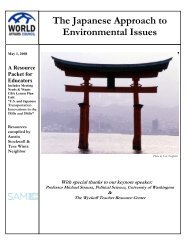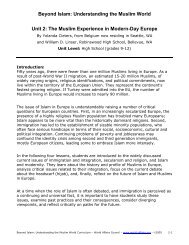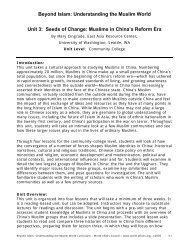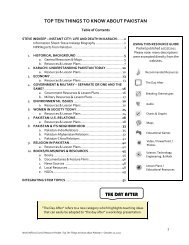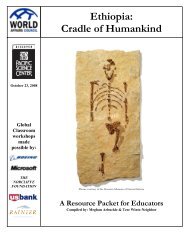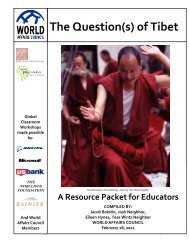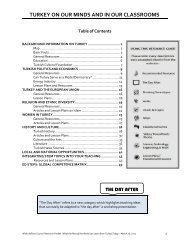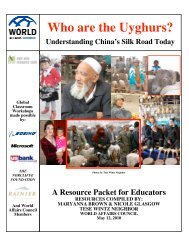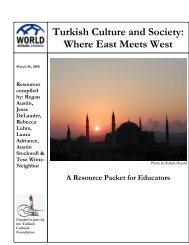If King Tut Could Talk - World Affairs Council
If King Tut Could Talk - World Affairs Council
If King Tut Could Talk - World Affairs Council
- No tags were found...
Create successful ePaper yourself
Turn your PDF publications into a flip-book with our unique Google optimized e-Paper software.
Imperialism and the Repatriation of ArtifactsConstructing Arguments and Debates:Should Artifacts Be Repatriated?Common Core ConnectionTHE DAY AFTEREssential Questions: Should antiquities be viewed as the property of the states where they are found or asglobal heritage? Given the history of national and imperialist conflicts, are countries right to demand thereturn of artifacts? What is the international norm with regards to laws related to antiquities and where is theconversation heading? What are the priorities informing this debate?Explain that some museum collections around the world are a legacy of imperialism (e.g., The BritishMuseum’s Rosetta Stone of Egypt). Divide students into two groups—one “pro” group and one” con” group.Have the “pro” group read the article by Malcolm Bell and the “con” group read the article by James Cuno.PRO: Yes, artifacts should be repatriated.CON: No, artifacts should NOT be repatriated.By Malcolm Bell III, professor emeritus at theUniversity of Virginia:“The Oxford English Dictionary” defines“repatriate as “to restore (an artifact or otherobject) to its country or place of origin,” andrecognizes repatriation as a process ofrestoration, of making whole again. Manyartifacts and works of art have special culturalvalue for a particular community or nation. Whenthese works are removed from their originalcultural setting, they lose their context and theculture loses a part of its history…”By James Cuno, president and Director of the ArtInstitute of Chicago and author of Who OwnsAntiquity?“Art museums in the United States are dedicated tothe professional stewardship of the works of art in theircare. Curators and directors of museums with artrepresenting the world’s many cultures believe that byintroducing visitors to a diverse range of art we canhelp to dissipate ignorance about the world, whilepromoting inquiry and tolerance of culturaldifferences…When art and culture are strictly attachedto a nation, we lose the cross-culture ties that bindmany different peoples together…”For the full articles:http://iipdigital.usembassy.gov/st/english/publication/2010/10/20101022140412aidan0.7519953.html#axzz29a1NgwsQHave students create and answer the essential questions surrounding the topic of repatriating antiquities.Next, have students debate or write persuasive essays in class. Students will…1) Clearly describe the issue and the main points.2) Determine if substantive evidence was used.3) Use evidence to explain why they agree or disagree.4) Evaluate a speaker’s (or writer’s) point of view and reasoning using evidence.Reflection: As a whole class, discuss whether anyone’s opinions changed or whether they consider the issue tobe “black and white.” Reflect on the debate and real-world examples in journals or as a class.Variation: <strong>If</strong> your students need more structure or thrive in role-play or group situations, try using the cardsand lesson plan on UCL Museums website that provide students with opinions that they can discuss in groups.They then can decide where they fall on the Agree-Disagree spectrum as a group.Lesson Plan:http://www.ucl.ac.uk/museums/learning/documents/Critical_thinking_about_museums_lesson_plan_.pdfResources: http://www.ucl.ac.uk/museums/learning/documents/Critical_thinking_about_museums_resources.pdf<strong>World</strong> <strong>Affairs</strong> <strong>Council</strong> Resource Packet: Pacific Science Center Presents—The Golden <strong>King</strong> and the Great Pharaoh: November 1, 201223



